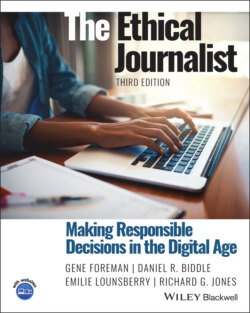Читать книгу The Ethical Journalist - Gene Foreman - Страница 61
Point of View Journalists Are Humans, Too
ОглавлениеThe reporters’ actions … got a vulnerable person out of harm’s way.
By Halle Stockton
JOURNALISTS ARE TAUGHT to avoid conflicts of interest, and we try to learn how to observe a situation like a fly on the wall.
Even so, reporters occasionally become part of the story.
The public usually hears about plagiarism scandals and journalists refusing to name sources (or complaining about their hotel arrangements at the Olympics).
But there are reporters in communities across the nation who are faced with less‐publicized challenges of how to abide by a code of ethics while also remaining human.
An example of this occurred in Pennsylvania with two Philadelphia Daily News reporters. Wendy Ruderman and Barbara Laker were contacted by an anonymous caller with concerns about the safety of Clarence Shuford, a 47‐year‐old man with physical and intellectual disabilities.
They learned Shuford and the actions of his caregiver, Barbara Floods, were not being supervised closely, so they visited the home and asked to go inside.
Floods invited the reporters up to her second‐floor apartment, where a barefoot Shuford, dressed in a plaid shirt and gray denim pants, sat meekly on a leather sofa next to a table covered with dusty prescription‐pill bottles and an open bag of adult diapers.
His eyes were bloodshot and puffy, rimmed underneath with inky black circles. His bottom lip appeared swollen. He looked unkempt, with bits of white lint stuck to his closely cropped hair. Small flies circled his head.
Ruderman and Laker toured the apartment, noting the food in the refrigerator, the sleeping arrangements, and Shuford’s nervous demeanor when checking to see if Floods was listening to what he said.
They left uneasy, a feeling quickly confirmed by neighbors.
A group of men stood on a nearby street corner. In hushed tones, without giving their names, they said that Floods repeatedly beat Shuford. It was no secret – she treated him like “a punching bag,” one man said.
“You gotta get him outta there,” he said, stealing a look at Floods’ house.
Wendy Ruderman (left) and Barbara Laker of the Philadelphia Daily News, who won the 2010 Pulitzer Prize for investigative reporting.
Photo by David Maialetti, courtesy of the Philadelphia Daily News.
The journalists called about Shuford to a state‐run hotline established under the Adult Protective Services Act to field reports of abuse or neglect of adults ages 18 to 59 with physical or intellectual disabilities.
Investigators with the Department of Public Welfare and the Philadelphia Police Department got involved, and Shuford was removed from the home about a week later.
He revealed scars, whip marks and other injuries that he said were a result of his caretaker’s abuse.
At the time of the story, Shuford had moved in with his brother.
The reporters’ actions were certainly not characteristic of a fly on the wall, but they got a vulnerable person out of harm’s way.
Though the caretaker is not a politician or a company CEO, she still held a position of power, and their reporting held her accountable.
And with this reporting, they also illuminated some deficiencies in the state’s enactment of the law meant to protect this population.
All characteristics of great journalism.
This essay was published on February 20, 2014, on PublicSource.org, an independent organization in Pittsburgh that produces in‐depth reporting on social issues, criminal justice, money and politics, and the environment in Pennsylvania. Quotations in the essay are from Wendy Ruderman and Barbara Laker’s article “Disabled man kept virtual hostage -- until one phone call,” Philadelphia Daily News, January 31, 2014.
